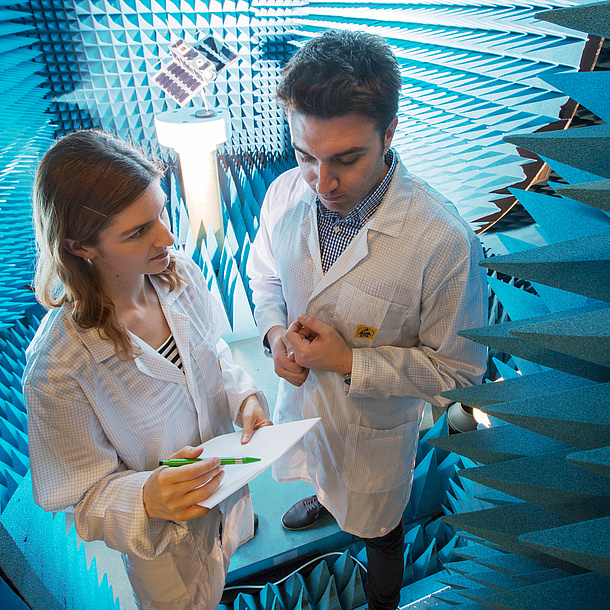- Duration of study: 4 semesters
- ECTS credit points: 120
- Academic degree: "Diplom-Ingenieurin" or "Diplom-Ingenieur" ("Dipl.-Ing." or "DI"), equivalent to the Master of Science (MSc)
- Language of instruction: German
The Master's Programme
Whether you want to capture 3D images of Mars, take magnetic field measurements near the sun, or collect high-resolution satellite data of the Earth for use in navigation systems, climate data and crisis management: The expertise in Graz has contributed to active space missions for more than 30 years.The Master's degree programme in Space Sciences and Earth from Space prepares you to play your own role in high-tech space projects. You
- apply space science methods and models in the context of complex research projects.
- review and improve upon the methods and technologies you have learned, solve problems and carry out scientific investigations.
- create mathematical models and interpret natural phenomena.
- plan, organize and carry out research projects in your subject of specialization. You can represent specialized information, ideas, problems and solutions to colleagues and members of the public.
- are aware of the potential ethical, societal, economic, environmental and safety implications of your discipline.
- work on current research projects and thus receive an education based on the latest scientific development.
After receiving an introduction to the field of Earth and space sciences, satellite systems and data Analysis and data Modelling, you will choose a specialization in one of three elective modules:
Solar System Physics
- Solar physics and effects of solar activity on the planets.
- Measurement and data analysis methods used to describe the solar system.
- Image recognition, image analysis and machine learning.
- Plasma physics and planetology.
Satellite Systems
- Communications engineering, signal processing and space physics.
- Satellite systems and communications.
- Navigation procedures and measurement methods.
Earth System from Space
- Components of the Earth system (e.g. magnetic field, atmosphere, climate, oceans).
- Satellite geodesy and reference systems.
- The analysis and numerical modelling of space-based data.
The accompanying in-depth subjects of specialization consolidate your knowledge even further. The programme has an international orientation, and numerous courses are held in English. By the time you write your final master's thesis, you will often already be involved in current research projects.

Space Sciences and Earth from Space is an ideal Master's programme for space enthusiasts who want to deepen their knowledge in near-Earth astrophysics, satellite systems or satellite observations. In my case, the Bachelor's degree in physics was the starting point. I was able to put what I had learned into practice as a system engineerand project leader at the Aerospace Team Graz. In addition, the degree programme prepared me very well for the following doctoral studies that I am currently completing at the Space Research Institute Graz.
As a student of the Master's degree programme in Space Sciences and Earth from Space, you will become part of a community that uses state-of-the-art technology to take good care of spaceship Earth: TU Graz, the University of Graz, the Space Research Institute at the Austrian Academy of Sciences and Joanneum Research jointly teach and conduct research in the field of space sciences and technologies.
The researchers working here have turned Graz into an internationally renowned research hotspot for micro- and nanosatellites, measurement systems, numerical modelling and Earth observation.
During your studies, you even have the chance to become a member of a research team and learn how to use the most modern methods and laboratory equipment to study satellite communication and observe the stars and Earth.
Admission
Graduates of the following TU Graz bachelor’s degree programmes are admitted to the master’s programme without having to fulfil any further requirements:
- Physics
- Geodesy
- Electrical Engineering
- Information and Computer Engineering
- Electrical Engineering and Audio Engineering
Graduates of other preliminary degree programmes should please see the curriculum (in German) to learn whether they are eligible for admission with and without further requirements.
Graduates of other Austrian universities can apply for admission.
Graduates of other foreign universities can obtain information and apply for admission by contacting study@tugraz.at.
- Admission and deadlines for Austrian students who are beginning their studies at TU Graz for the first time
- Admission and deadlines for international students
- If you are or were already admitted to a degree programme at TU Graz, please come to the TU Graz Registrar’s Office in person during the admission period or contact study@tugraz.at.
Contact study@tugraz.at
Career Prospects
Compared to the size of Austria, the aerospace industry is disproportionately strong in this country. In addition to individual international technology leaders, many smaller, highly specialized companies and institutions are based here that make important contributions to the success of space missions by providing research services. The Alpine republic also enjoys a fantastic reputation with the Paris-based European Space Agency (ESA).
As a programme graduate, your potential fields of activity include:
- Research and production in companies that manufacture and supply equipment and expertise for space missions and Earth observation.
- Research on and the development of probes, measuring instruments and satellite components in university and non-university research facilities.
- Conducting analyses and modelling of satellite data for research institutions, public authorities and companies.
- Performing management activities in space missions and Earth observation tasks.
Acquire AI skills: AIE Extension Programme
Increase your career prospects with the Artificial Intelligence Engineering (AIE) extension programme and learn essential skills in AI development and application during or after completing your Master's degree.




